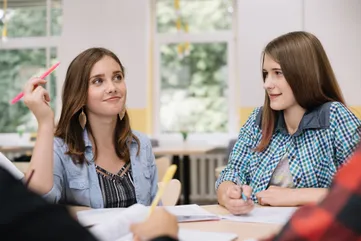Twice Exceptional
Twice exceptional (2e) refers to students who are both gifted and have learning differences, disabilities, or neurodevelopmental conditions like ADHD or autism.
Why 2e students struggle despite brilliance
Twice exceptional students face unique challenges as their giftedness can mask their struggles while their challenges overshadow their gifts.
Common 2e patterns:
• Advanced vocabulary but illegible handwriting
• Complex problem-solving but forgot homework exists
• Deep subject expertise but failing grades
• Creative brilliance but social struggles
• Reading at college level but can't organize backpack
• Philosophical discussions but emotional meltdowns
These contradictions confuse parents, teachers, and the students themselves.
You're not alone
If your child discusses quantum physics but can't tie their shoes, or reads at high school level but has kindergarten-level emotional regulation, you might have a 2e learner. Research suggests 6-10 percent of gifted students are also 2e, though many go unidentified. The asynchronous development creates unique parenting challenges. Your child isn't lazy or deliberately difficult; their brain simply works differently across domains.
What it looks like day to day
Student
Your teen writes brilliant creative stories but needs help remembering to eat lunch or turn in assignments.
Parent
You attend the same meeting where teachers praise your child's intelligence and express concern about their failing grades.
Tiny steps to try
- 1
Strength spotlighting
Start with strengths in every conversation. "Your ideas are amazing. Let's figure out how to capture them."
- 2
Accommodation without shame
Provide support tools without implying failure. Everyone uses calendars and reminders.
- 3
Interest-led learning
Let deep interests drive learning when possible. This maintains engagement despite challenges.
- 4
Executive function scaffolding
Provide organizational support while celebrating intellectual abilities. Both are real and valid.
- 5
Peer connections
Find other 2e kids. Feeling understood reduces isolation and builds identity.
Why understanding 2e matters
Recognizing twice exceptionality prevents misdiagnosis, inappropriate interventions, and the emotional damage of being misunderstood throughout childhood.
Research by Reis and colleagues shows that unidentified 2e students often develop anxiety, depression, and school refusal from the tension between their abilities and struggles.
References
Reis, S. M., Baum, S. M., & Burke, E. (2014). An operational definition of twice-exceptional learners: Implications and applications. Gifted Child Quarterly, 58(3), 217-230.
Foley-Nicpon, M., Assouline, S. G., & Colangelo, N. (2013). Twice-exceptional learners: Who needs to know what? Gifted Child Quarterly, 57(3), 169-180.
Ready to help your teen thrive?
Get personalized 1-on-1 coaching to build better habits and boost grades. Join 10,000+ families who trust Coachbit.
Frequently Asked Questions
How can my child be gifted if they're failing classes?
Giftedness is about cognitive ability, not grades. Many factors affect academic performance: executive function, processing speed, attention, and emotional regulation. A 2e student might understand calculus but forget to turn in homework. Their struggles don't negate their gifts. Both aspects need recognition and support for success.
Should we focus on strengths or weaknesses?
Both, but lead with strengths. Constant focus on deficits damages self-esteem and obscures gifts. However, ignoring challenges prevents necessary skill development. The ideal approach: celebrate and develop strengths while providing compassionate support for challenges. Frame accommodations as tools for accessing their potential, not crutches for deficits.
Related Terms
ADHD (Attention-Deficit/Hyperactivity Disorder)
ADHD is a neurodevelopmental condition where the brain's executive function system works differently, affecting focus, impulse control, and activity levels in about 5-10% of children.
Learning Disabilities
Learning disabilities are neurological conditions that affect how the brain processes information in specific areas like reading, writing, or math, despite typical intelligence.
Neurodiversity
Neurodiversity is the concept that neurological differences like ADHD and autism are natural human variations rather than disorders to cure, deserving acceptance and accommodation.
Related Articles

The 6 Best Study Skills for ADHD Teens
Learn the 6 best study skills for ADHD teens to boost their academic success. Prioritization, note-taking, dedicated study space, brain breaks, and multi-sensory learning. Find out how an ADHD coach can help!
Read article
3 Ways an Executive Functioning Coach Can Help Your Child
Discover why executive functioning skills are crucial for your child's success. Learn how an executive functioning coach can make a difference
Read article
